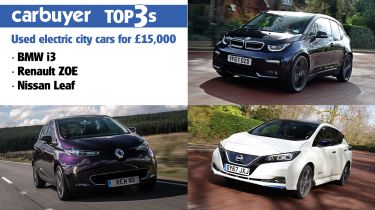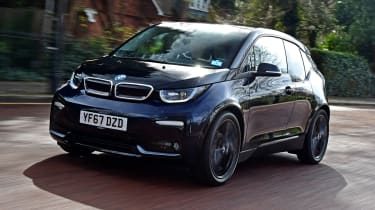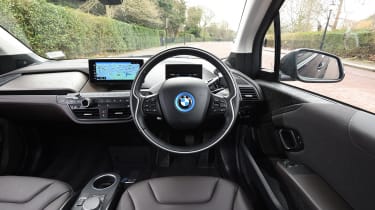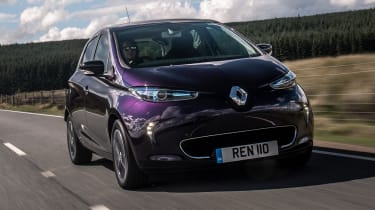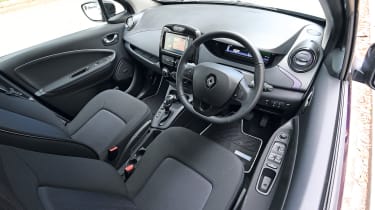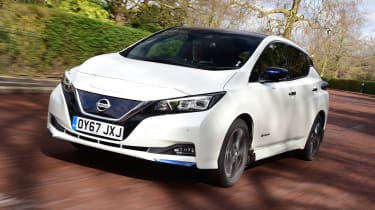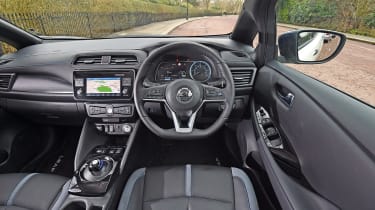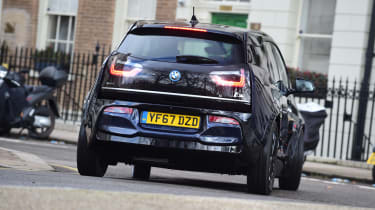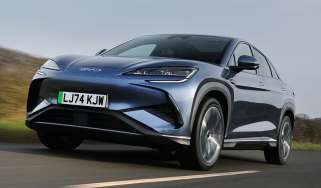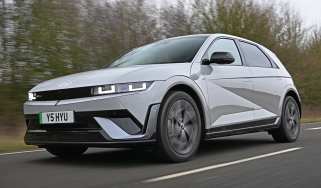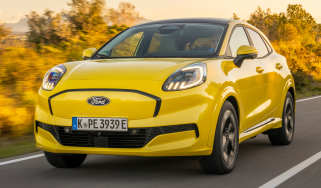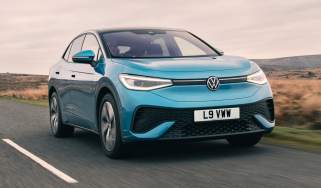Top 3 used electric city cars for £15,000
Dear Carbuyer, I’m looking for a cheap electric commuter car to drive in London. What can I get for £15,000?
It’s no secret that travelling around London is expensive; a Zone 1-6 TFL travel card can cost up-to £20 per day, while those choosing to brave the busy streets of London via car are subject to hefty tariffs Congestion Charge and Ultra Low Emissions Zone (ULEZ). Thankfully, the popularisation of electric vehicles means that there is now a more convenient and affordable way to traverse our nation’s capital. If you, like our reader, have £15,000 to spend on an electric city car, read on to see our top picks.
 Top 10 best London Congestion Charge exempt cars 2025
Top 10 best London Congestion Charge exempt cars 2025
One of the big advantages of driving an EV in the city is being able to dodge the London Congestion Charge and the ULEZ - if you’re unlucky to be liable for both, that’s a combined charge of £27.50 a day. And while many newer cars are exempt from the former, only full EVs don’t have to pay either.
Driving electric also brings more benefits; fuel prices are currently at an all-time-high and while energy bills are beginning to soar too, charging up an EV still costs significantly less than the equivalent petrol or diesel car. EV owners are also able to dodge yearly road tax bills and, for company car drivers, electric cars typically boast low Benefit-in-Kind (BiK) ratings, resulting in negligible company car tax.
However, electric cars have a fatal flaw: their high price. While combustion-engined cars have been around for more than a century, electric cars are a relatively recent development and so cost more to build and buy. There are cheaper and smaller electric cars around on the new and used market, but these typically come with a smaller battery and, subsequently, a more limited range.
Thankfully, this is not so much of an issue for those living in the city – metropolitan areas such as London typically have strong charging infrastructure, plus those spending most of their time in the city do not frequently drive long distances, anyway.
We have searched the internet and found three of the best cheap used EVs that will slot into any city dweller’s life. If you’re looking for something a bit newer, why not check out our guide to the best small electric cars? Read on to see which of these voltaic vehicles is our favourite.
The premium choice: BMW i3
FOR: Quick, good build quality, long range, smart looks
AGAINST: Only four seats, small boot, expensive
You can buy the BMW i3 as a straight EV or with a range-extending petrol engine, which acts as a generator to charge the batteries. Either way, it’s a cracking little car; however, those going into London will be better off with the EV model as only this is exempt from the dreaded Congestion Charge. Thanks to its small size and brisk acceleration the i3 feels nippy in cities, and despite skinny tyres meaning grip could be better, the BMW’s rear-wheel-drive set-up and decent performance make it rewarding to drive. It also looks like nothing else on the road.
With bamboo, natural fibres and other thoughtful materials throughout, the BMW i3 offers one of the most interesting cabins in recent memory, all backed up by good build quality and decent technology. The i3 is strictly a four-seater, though, with the back seats accessed through rear-hinged doors. Space back there is tight for adults, however, and the view out is partially blocked by the B-pilllars. Boot space is a so-so 260 litres, but this rises to 1,100 litres if you fold the rear seatbacks down.
We found a 16-plate, 55,000-mile i3 94Ah (fully electric, 168bhp, 0-62mph in 7.3 seconds, 195-mile range) for just under £15,000.
The comfy choice: Renault ZOE
FOR: Good value for money, lots of kit, spacious interior
AGAINST: Cabin quality, lots of hard plastics inside
Although the Renault ZOE is larger than the BMW i3 and not as quick, it’s still a competent car on both urban and rural roads. The steering is somewhat light, but this arguably adds to its easy-going nature as much as anything. The ZOE also has a comfortable ride and is impressively refined on a cruise, with minimal wind and road noise intruding into the cabin.
Although the current ZOE isn’t within your budget, you can still stretch to a fairly recent version of the previous generation that features plenty of kit, including touchscreen infotainment. The overall interior design is a bit dull, though, especially compared with the BMW i3’s, while some hard plastics are present in the cabin, too. Practicality is a strong area for the ZOE; there’s decent room in the rear seats and you’ll find an excellent 370 litres of boot space behind them.
We found a 19-plate ZOE R110 41kWh Dynamique Nav (107bhp, 0-62mph in 11.4 seconds, 186-mile range) with 18,000 miles notched up on sale for £14,000 precisely.
The practical choice: Nissan Leaf
FOR: Large boot for this class, smooth e-Pedal drive
AGAINST: Suspension can be harsh, divisive looks
The Mk1 Nissan Leaf was the world’s first mass-produced electric car, and introduced EV motoring to hundreds of thousands of people. The Mk2 model here adopted an angular, futuristic design that may appeal to some more than others. As with most EVs, the Leaf offers very smooth acceleration and, like the ZOE, has quite light steering. One slight issue is the suspension, which can be unnecessarily harsh.
The Leaf’s interior is more exciting than the ZOE’s, but not as innovative as the i3’s. The overall build quality is pretty strong, while the infotainment system brings decent features, even if it’s not the slickest. Although the rear seats in the Nissan are slightly raised, the overall amount of headroom and legroom isn’t bad. The boot is by far the best of these three cars, though; you get an impressive 435 litres of cargo space, and this expands to 1,176 litres when you fold the back seats down. That’s an excellent figure for a small electric vehicle that has batteries to accommodate under the floor.
Something to bear in mind is that examples of the current-generation Leaf are somewhat scarce on the used market at this price point. A 70,000-mile, 18-plate 40kWh Acenta (148bhp, 0-62mph in 7.9 seconds, 168-mile range) will set you back around £15,000.
Carbuyer’s choice:
The i3 was first launched alongside the BMW i8 hybrid sports car back in 2011, and it stands as a testament to BMW’s brilliant design that the small electric hatchback still looks futuristic today. The Beemer’s sleek looks and premium badge will fit right into city life, and while its boot is smaller than both the Renault and Nissan, the i3’s compact dimensions should make it a doddle to park on packed, narrow streets. With the longest range here, it’s also possible to take the i3 out of the city and into more suburban areas, where thanks to its rear-wheel-drive setup, this dinky electric runaround drives just as well as any BMW should.
Looking to commute a little further? Check out our list of the Top 10 best motorway cars
Recommended
Most Popular

New Smart #5 Brabus is a 637bhp far cry from the brand’s city car past

Best car leasing deals 2025: this week’s top PCH offers
Tips & advice

Car dashboard warning lights: what does each symbol mean?

Electric car charging stations: public networks, charger types, apps and maps


